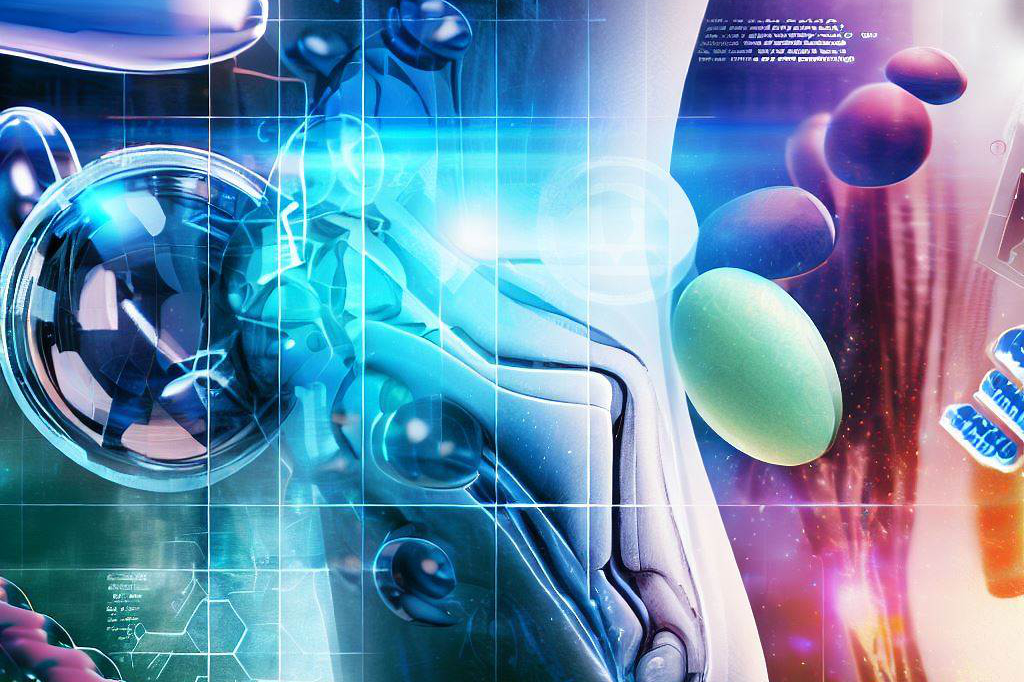The Promise and Peril of General Enhancement
Definition of General Enhancement
“General enhancement” refers to the use of technology to improve the overall performance and capabilities of the human body and mind beyond what is considered normal or typical. The idea behind general enhancement is to enable humans to achieve their full potential in every aspect of life, be it physical or mental. The technologies used in general enhancement can range from simple things like caffeine and energy drinks to more complex technologies like brain implants and gene editing.
Types of General Enhancement Technologies

There are various types of general enhancement technologies currently available, with new advancements being made regularly. Some examples include:
– Cognitive Enhancers: These are substances that improve cognitive function by boosting memory, focus, creativity, and alertness. Examples include caffeine, nicotine, modafinil, and Adderall.
– Physical Enhancers: These are technologies that enhance physical performance by improving strength, endurance, speed, reaction time, etc. Examples include steroids or prosthetics.
– Genetic Enhancers: These are techniques that use genetic engineering to modify human genes with the goal of enhancing natural abilities such as intelligence or physical prowess.
Ethical Considerations in General Enhancement

The topic of general enhancement has sparked numerous ethical debates surrounding issues like fairness, safety concerns, and access. Some ethical considerations regarding general enhancements include:
– Fairness: One concern is that if these technologies become widely available, only for those who can afford them will get ahead, leaving others at a disadvantage.
– Safety Concerns: Another concern is related to the safety risks associated with some enhancements that may pose risks; for example, genetically modifying humans could result in unforeseen consequences down the line.
– Access: There is also an issue with the availability/ accessibility of these technological enhancements, which further exacerbates inequality.
Overall while there is certainly a lot of promise within new advancements in general enhancement, there are also ethical concerns that need to be addressed in order to ensure that these technologies ultimately serve the greater good.
Hello to Transhumanism
Transhumanism is a philosophical movement that advocates for the use of science and technology to improve the human condition. This movement seeks to enhance human abilities beyond what is currently possible through natural means. These enhancements could be achieved through various means, including
- genetic engineering,
- cybernetics,
- and cognitive enhancers.
Definition of Transhumanism

Transhumanism is a philosophical and cultural movement that advocates for the use of science and technology to transcend the limitations of human biology. The goal of transhumanism is to improve the human condition through various forms of enhancement. These enhancements could be physical, such as genetic engineering or cybernetic implants, or cognitive, such as nootropics or brain-computer interfaces.
Transhumanists believe that humans can and should overcome their biological limitations in order to achieve
- longer lifespans,
- increased intelligence and creativity,
- enhanced emotional well-being,
- and freedom from disease and disability.
They see technology as a means to achieve these goals.
Brief History of Transhumanism
The concept of transhumanism can be traced back to ancient Greek mythology with tales of gods who possessed superhuman abilities beyond those of mere mortals.
However, it wasn’t until the 20th century that transhumanist ideas began to take shape in earnest. The term “transhumanism” was first coined by Julian Huxley in 1957 in his book “New Bottles for New Wine.” In the decades since then, transhumanist ideas have been explored by a number of philosophers and futurists, including Ray Kurzweil, Aubrey de Grey, Nick Bostrom, Max More, and Anders Sandberg.
Today’s transhumanist movement has its roots in both science fiction literature and real-world technological advancements. In recent years there has been significant progress in areas such as gene editing CRISPR Cas9, artificial intelligence and brain-computer interfaces, furthering the development of transhumanist technologies.
Importance of Ethics in Transhumanism
Transhumanism presents a complex set of ethical challenges. The enhancement technologies that are central to transhumanism have the potential to radically alter the human condition. As such, it is crucial that these technologies are developed and implemented with careful consideration for their ethical implications.
One major issue that arises in transhumanist discussions is informed consent. If individuals choose to enhance themselves using emerging technologies, then they must be fully aware of any risks associated with these enhancements.
To ensure this, guidelines and regulations need to be put in place that protect individuals from making uninformed decisions about their own bodies. Another issue is ensuring that enhancement technologies are accessible to all members of society.
There is a risk that if only a small group can access these new technologies, it could create social inequality and division. It’s also important to consider how enhancements could exacerbate existing power structures if certain groups have an unfair advantage over others due to access or ability.
While transhumanism offers the possibility of significant benefits for humanity, it also presents significant ethical dilemmas. By carefully considering these issues and developing appropriate regulations and guidelines around enhancement technology research, we can work towards creating a future where everyone has equal access and opportunity for improvement.
Human Augmentation and Ethics

Definition of Human Augmentation
Human augmentation, also referred to as “human enhancement,” involves the use of technological or biological means to improve human abilities beyond what is considered normal. This can involve physical changes, such as implanting devices or altering DNA, or cognitive changes, such as improving memory or intelligence. Human augmentation has the potential to greatly enhance the quality of life for many people but also raises ethical concerns about safety, equality, and consent.
Types of Human Augmentation
There are many types of human augmentation technologies that have already been developed or are currently in development. These include:
– Prosthetics: Devices that replace lost limbs or enhance existing ones.
– Exoskeletons: Mechanical structures worn on the outside of the body to increase strength and mobility.
– Neural implants: Devices that interface with the brain to control movements or enhance cognitive abilities.
– Genetic engineering: Altering DNA to improve physical characteristics or prevent disease.
– Performance-enhancing drugs: Chemicals that increase strength, endurance, and other physical abilities.
Ethical Considerations in Human Augmentation
The use of technology to augment human abilities raises significant ethical concerns. One major issue is informed consent – individuals must fully understand the risks associated with any procedure before they can make an informed decision about whether or not they want it done.
Additionally, there are concerns about safety – some procedures may be inherently dangerous or carry long-term health risks. Another important consideration is equality – if only certain individuals can afford expensive enhancement procedures, this could lead to further societal inequality.
Informed Consent

Informed consent is a crucial component of any medical procedure, but becomes especially important when it comes to human augmentation technologies. Individuals must be fully informed about all the potential risks and benefits associated with a procedure before they can give their informed consent.
This requires clear and concise information about the potential outcomes as well as a discussion about the potential risks and benefits of the procedure. Additionally, individuals must have the capacity to understand the information presented to them and make informed decisions based on their own values.
Safety and Risks
Safety is a major concern when it comes to human augmentation technologies. Some procedures may carry significant risks or require invasive surgeries that could result in serious injury or death.
Because many of these technologies are still in development, it is difficult to fully understand all of the potential risks associated with them. It is important for individuals considering human augmentation procedures to fully research all of their options and weigh the potential benefits against any possible risks.
Equality and Accessibility
One major ethical concern regarding human augmentation technologies is accessibility – if only certain individuals can afford expensive enhancement procedures, this could lead to further societal inequality. The development of these technologies must take into account issues of social justice and fairness in order for their benefits to be accessible to everyone who stands to benefit from them. It is important that policies regarding access to these new technologies be developed with careful consideration so that everyone can benefit from them equally, regardless of socioeconomic status.
Life Extension and Ethics

Definition of Life Extension
Life extension is the process of prolonging human life beyond its naturally occurring limits. The goal is to slow down or even reverse the aging process so that people can live longer healthier lives. Life extension technologies include a wide range of interventions such as calorie restriction, genetic engineering, stem cell therapy, and hormone replacement therapy.
Types of Life Extension Technologies
There are two types of life extension technologies.
The first type includes interventions that aim to slow down ageing by reducing the damage caused by age-related processes. These interventions include
- calorie restriction,
- exercise,
- and taking certain supplements like resveratrol or NAD+ precursors.
The second type includes interventions aimed at repairing the damage caused by age-related processes. These interventions include
- stem cell therapy,
- gene therapy,
- and senolytics – drugs that selectively kill senescent cells in order to reduce inflammation and other negative effects on tissues.
Ethical Considerations in Life Extension
The pursuit of life extension raises several ethical concerns related to quality vs. quantity of life, resource allocation, and social impacts. One ethical concern is whether it’s worth extending life if it means sacrificing quality for quantity.
This raises questions about what constitutes a good or meaningful life and whether a prolonged existence with decreased functionality is desirable. Another concern is resource allocation – should society invest resources in extending individuals’ lives when there are pressing needs such as poverty reduction or climate change mitigation?
This consideration also involves socioeconomic disparities in access to life-extension technologies. There are social impacts related to extending human lifespans – for example, on family structures, economic systems, environmental sustainability and cultural attitudes towards death.
Society may need to adapt to handle populations with increasing numbers of elderly individuals who may require more medical care or retirement benefits for extended periods. While the pursuit of life extension is a potentially transformative area of research and development, it raises complex ethical dilemmas that need to be carefully considered and addressed in order to ensure equitable access and socially responsible outcomes.
General Enhancement and Ethics
General enhancement refers to the use of technology to improve or augment human capacities or faculties beyond what is considered normal or natural. It encompasses a wide range of technologies that can enhance various aspects of human life, such as cognitive, physical, sensory, emotional, and social abilities.
General enhancement technologies are still in their infancy, but they hold promise for improving the quality of life for individuals and society as a whole.
Types of General Enhancement Technologies
There are many types of general enhancement technologies that are being developed, including:
- Neuroenhancement: This involves the use of drugs or other techniques to enhance cognitive function, such as memory, attention, creativity, and learning ability.
- Biomedical enhancements: This includes gene editing and other genetic therapies that can alter physical characteristics or traits.
- Cyborgization: This involves combining biological and technological components to create hybrid beings with enhanced abilities.
- Nanotechnology: This technology involves manipulating matter at the molecular level to create new materials or devices that can enhance physical capabilities.
Ethical Considerations in General Enhancement
The development and use of general enhancement technologies raise several ethical concerns. One major concern is fairness and equality in access to these technologies. If these enhancements become available only to the wealthy elite, it could lead to further societal inequality.
Another concern is safety and effectiveness – there is no guarantee that these enhancements will work as intended without any unintended consequences or risks. The impact on human identity is also a significant ethical consideration.
If humans start modifying themselves beyond what is considered normal or natural, it could lead to questions about what it means to be human. Additionally, there are moral obligations towards future generations regarding how we shape our own evolution through these enhancements.
We must consider the long-term effects and implications of these decisions for future generations. Overall, the development and use of general enhancement technologies require careful consideration of their ethical implications to ensure that they are used in a responsible and equitable manner.
Balancing Individual Freedom with Social Responsibility

One of the main moral dilemmas surrounding transhumanism is the balance between individual freedom and social responsibility. On the one hand, individuals should have the right to augment their bodies or extend their lives as they see fit. They may argue that it is their body and they should have complete control over what happens to it.
However, on the other hand, society has a responsibility to ensure that these enhancements do not harm others or create a divide between those who can afford them and those who cannot. To address this issue, some proponents of transhumanism suggest creating regulations that balance individual autonomy with social responsibility.
For example, any new enhancement technology should undergo rigorous testing to ensure its safety for personal use as well as its impact on society as a whole. Additionally, individuals seeking to enhance themselves should be required to undergo counseling or education about the potential risks and societal implications of their choice.
The Role of Government Regulation

Government regulation plays a significant role in navigating the moral dilemmas of transhumanism. While some may argue that strict government regulation would inhibit innovation and progress in this field, others warn against unregulated enhancements that could lead to disastrous consequences for both individuals and society. In order to navigate this delicate balance between freedom and regulation, governments must consider multiple factors: ensuring safety for users of enhancement technologies; addressing accessibility issues so that enhancements are not just available only for wealthy people; assessing the societal impact on access levels due to economic conditions; examining ethical questions about enhancement technology itself; devising methods for an equitable distribution system while avoiding conflicts of interest or lobbyist influence.
Cultural Attitudes Towards Transhumanist Technologies

Cultural attitudes toward transhumanist technologies can vary widely across different communities. Some may view these technologies as a natural progression towards improving humanity, while others may view them as unnatural or even morally wrong.
To navigate these cultural attitudes, proponents of transhumanism can engage with the general public through education and debate on the potential benefits and risks of these technologies. This includes discussing ethical considerations and addressing concerns about inequality, social impact, privacy, and security.
Developing a better understanding of different cultural attitudes towards transhumanism will help individuals, policymakers, and society navigate the moral dilemmas inherent to this field. Navigating the moral dilemmas of transhumanism requires balancing individual freedom with social responsibility, and government regulation that ensures safety while also addressing accessibility issues and societal implications.
Cultural attitudes towards transhumanist technologies must also be taken into account in order to create an ethical framework for this developing field. With thoughtful consideration of these factors, we can create a future where technology works in harmony with human values rather than against them.
Long Story Short
Transhumanism is a rapidly growing field that seeks to enhance human capabilities, extend lifespans, and improve the overall quality of life. However, in pursuing these goals, serious ethical dilemmas arise that require careful consideration.
The Importance of Ethics in Transhumanism
As we continue to develop new transhumanist technologies, it is essential that we consider all aspects carefully, including ethics. As these technologies are designed to alter human biology on a fundamental level, it is paramount that we understand the effects they will have on individuals as well as society at large. The goal must be to create responsible policies that ensure fairness, equality, and transparency for all affected stakeholders.
Ethical considerations must be woven into every aspect of development, from research design to implementation, so that we uphold our moral obligations not just to ourselves but also to future generations. While transhumanism presents exciting possibilities for improving human lives, it cannot be pursued recklessly without considering its implications carefully.
The success or failure of transhumanist endeavors will depend on our ability to navigate complex moral dilemmas with intelligence and foresight. Ultimately, one thing is clear: ethics are an essential cornerstone of any truly successful transhumanistic enterprise.

C M, a seasoned editor, journalist, and consultant, is deeply fascinated by the convergence of technology, space, and the future of humanity.
With a particular interest in transhumanism, futurology, and the philosophical and ethical dimensions of these domains, C M serves as the lead contributor to TranscendSphere and SpaceSpotlight.
When not penning insightful articles on these rapidly evolving fields, C M indulges in their love for podcasts and books, proudly embracing their status as a ‘Happy Nerd Extraordinaire!’





